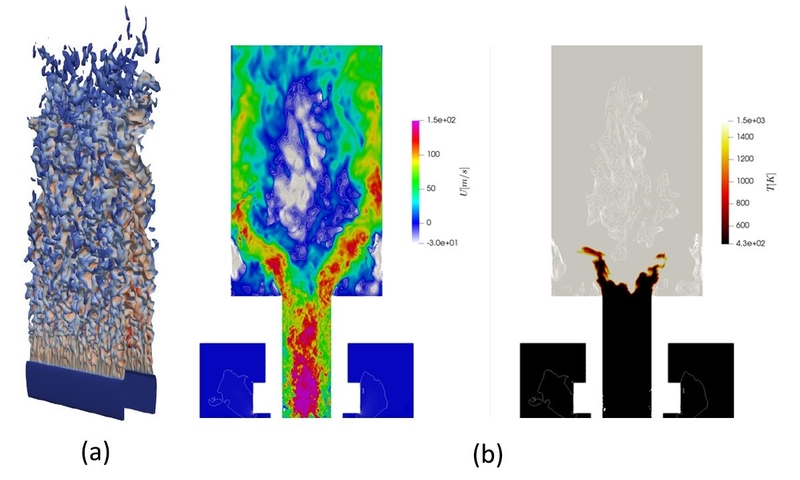The European Union is committed to achieving net-zero greenhouse gas emissions by 2050. To reach this goal, there is a need for coordinated research and innovation efforts to make low and zero-carbon solutions economically viable. The recently launched Center of Excellence in Combustion (CoEC) addresses this challenge using advanced modelling and simulation technologies to study the combustion of sustainable fuels and new combustion technologies in order to transform Europe´s power and transportation sectors.
Central to CoEC's work is the use of Exascale computing, which entails the use of massively parallel algorithms on supercomputers reaching speeds in the Exaflop/s range, that will define High Performance Computing (HPC) in the coming decade. Such speed will allow CoEC to target scientific breakthroughs in the field of combustion through the development of advanced simulation methodologies that can be transformed into a portfolio of high-end Exa-enabled services. At the same time, the project will further improve EU combustion codes towards Exascale-ready software to address fundamental challenges inherent in the decarbonisation objectives.
“Europe´s transition to Exascale has given CoEC the opportunity to explore the viability and reliability of alternative fuels such as e-fuels and biofuels in practical applications like never before,” said Daniel Mira, CoEC coordinator and senior researcher at the Barcelona Supercomputing Center. “Our research will have an impact on the decarbonization of the power and transport sectors by generating advanced modelling and simulation software that can be integrated into industrial workflows. This project will not only contribute to the development of computational models for improving engine design and operation, but will also assist in the digitalisation of the power and transportation sectors.”
CoEC aims to be a central figure in Europe´s HPC combustion community to face the current and future challenges for cleaner and more efficient power and propulsion systems. The project´s specific objectives are:
- To target scientific breakthroughs in combustion enabled by Exascale computing.
- To achieve significant advances in bringing combustion simulation technologies to market.
- To develop HPC software and algorithms for the efficient exploitation of Exascale systems.
- To promote and strengthen collaboration between the well-established European combustion and HPC communities, creating the European Exascale Combustion Community.
- To develop a services portfolio that includes standardized workflows and databases - targeting relevant stakeholders of the academic, industrial and Public Governance Bodies.

CoEC is developing advanced simulation software to study hydrogen combustion. The generation of green hydrogen from renewable energy sources or by Power-to-X (P2X) technologies require highly flexible and clean power plants that compensate for the fluctuations in production of the time-fluctuating renewable energy sources. CoEC is focused on fundamental and technological problems of the use of hydrogen in practical applications using (a) direct numerical simulations (DNS) and (b) large-eddy simulation (LES).
About CoEC
CoEC is a collective effort to exploit Exascale computing technologies to address fundamental challenges related to the simulation of combustion systems, which will create a positive impact on the EU´s decarbonisation goals. Coordinated by the Barcelona Supercomputing Center and granted with a budget of over €5.6M by the European Commission, the project will run from 1 October 2020 to 30 September 2023. Other partners in the consortium include leading institutions in the fields of computational combustion and High-Performance Computing such as Centre Européen de Recherche et de Formation Avancée en Calcul Scientifique (CERFACS), RWTH Aachen University, Eindhoven University of Technology, University of Cambridge, Centre National de la Recherche Scientifique (CNRS), Technical University of Darmstadt, ETH Zürich, Aristotle University of Thessaloniki, Forschungszentrum Jülich (FZJ) and National Center for Supercomputing Applications.
 The CoEC project has received funding from the European Union’s Horizon 2020 research and innovation programme under the grant agreement Nº 952181
The CoEC project has received funding from the European Union’s Horizon 2020 research and innovation programme under the grant agreement Nº 952181

